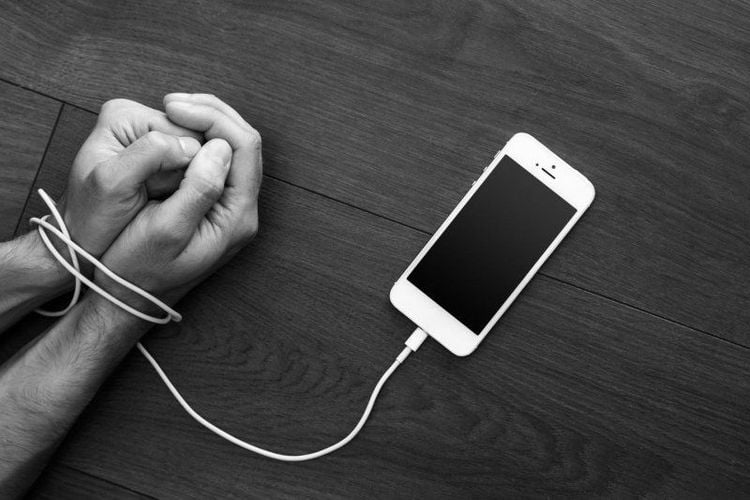This is an automatically translated article.
Smartphone is an almost indispensable item in today's modern life. However, the constant onslaught of information as well as spending too much time on your phone can lead to symptoms of addiction and take a big toll on your mental health.
1. The reality of smartphone addiction
Currently, smartphones have become an indispensable communication and entertainment tool for most people, especially young people. However, using the phone too much can lead to a very dangerous phone addiction.
According to a report from Pew Research Center, about 81% of Americans own a smartphone, with a trend of 35% increase in 2011. During the past 5 years, the Google Trends app has also shown that searches for “cell phone addiction” have increased dramatically. Spending too much time on the phone can give rise to a whole host of problems that experts have named with new terms, such as:
Monophobia: The fear of not having your phone by your side. Textaphrenia: Fear of not being able to send or receive messages. Phantom vibrations: A virtual vibration syndrome, that you feel like your phone is ringing or having a notification but it's not. In fact, there are very few people who believe that excessive phone use can cause addiction or any other health problems. However, there is now some debate among medical and mental health professionals as to whether smartphone use is really addictive or just the result of an impulse control disorder.
Many medical professionals have been reluctant to attribute the word “addiction” to any problem other than habitual substance abuse. But the Diagnostic and Statistical Manual of Mental Disorders (a handbook used in the medical community to diagnose mental disorders) has not recognized a behavioral addiction, namely gambling addiction. silver.
In fact, there are some similarities between behavioral addiction and cell phone abuse, including:
Loss of control over personal behavior. Difficulty limiting behavior. Tends to perform behaviors more often to achieve the desired feeling. Behavior with serious consequences. Feeling irritable, angry, or worried about not performing the behavior. Repeat or relapse into the habit after a period of avoidance. On the other hand, when we feel appreciated, our brain releases a chemical, called dopamine. For some people, cell phone use is one way to stimulate the release of this chemical. They see phones as a tool for social interaction, and some smartphone applications can cause many people to return to using them again and again to trigger the brain to release dopamine, which eventually leads to addiction. telephone .

Nghiện điện thoại thông minh có thể gây ảnh hưởng nghiêm trọng đến sức khỏe
2. Subjects at high risk of phone addiction
According to researchers, adolescents are at a higher risk of developing phone addiction than other age groups. Several tests have shown that cell phone use tends to peak during the teen years and then decline with increasing age.
According to recent statistics, smartphone use among teenagers is so common that up to 33% of 13-year-olds use their phones continuously day and night. For female adolescents, the tendency to use phones too much may develop as phones become an important tool for social interaction.
Besides, people with the following personality traits are also prone to phone addiction, including:
People with poor impulse control. People with low self-esteem. People who are upset or worried. Very extroverted person.
3. Typical symptoms of smartphone addiction
So how do you know if you are addicted to your phone excessively? Here are some signs to help you recognize smartphone addiction, including:
Constantly using your phone whenever you feel bored or lonely. Waking up several times at night to check his cell phone. Using your phone so much that it causes you an injury or an accident. You feel annoyed, angry, short-tempered or anxious when you can't use your phone. You are spending more and more time on your phone. People around you feel concerned about how you use your phone. Using your phone significantly affects your performance at work, school, and other relationships. Rapid relapse despite attempts to limit use.
4. Some harmful effects of phone addiction
One of the striking similarities of any addiction is perpetuating compulsive behavior, even when it can lead to extremely serious consequences.
For example, when you use your phone too much, such as texting while driving, it can cause 3 times more health and life threats, including causing injury or even death. is death. The dangers of using cell phones while driving have been widely warned, but many people overlook the risks and ignore them to pursue their desires.
In addition, phone addiction can also cause the following serious health problems:
Depression. Worry. Lack of sleep or suffer from frequent insomnia. There is a conflict between relationships. Poor academic performance or job performance. Distraction .

Bạn có thể gặp tình trạng thiếu ngủ do dùng điện thoại quá nhiều
5. Effective ways to detox from smartphone addiction
If your daily phone habits are taking a toll on your health, relationships, and work, maybe it's time to make some changes to get rid of your phone addiction. .
Find out the hidden worries in your daily life Researchers say that people who use their phones too much tend to be trying to avoid difficult or complicated problems to solve in life. So one of the first things to consider is what's bothering you.
Addressing the basics could be the key to reducing your anxiety and limiting your need to use your phone.
Apply cognitive behavioral therapy (CBT) CBT therapy can help clarify the connection between your thoughts, feelings, and behaviors. This is considered a very effective therapy to help people with phone addiction change their behavior.
A recent study shows that cognitive behavioral therapy (CBT) has the ability to rebalance the changes in brain chemistry that are associated with cell phone addiction. Therefore, if you think this therapy might help your condition, talk to your doctor for specific instructions.
Try some other practical ways In addition to the above treatments, you can also detox your smartphone with these other practical steps:
Remove time-consuming applications from your phone. your files, access them instead through another electronic device that you don't carry around with you all day. Change the settings on your phone, such as turning off notifications temporarily, to avoid interrupting your work. Turn the screen gray to avoid being woken up by phone light at night. Put some barriers around phone use to force yourself to think about what you're doing. For example, you can create questions on the phone lock screen like “Why am I using my phone now?” or “What do I use my phone for now?”. Keep your phone out of your sight. While sleeping, you can charge your phone somewhere else away from your bed. Develop other interests that nourish your soul. Instead of wasting time on games or social media apps, you can engage in practical activities like meeting friends, creating art, music, or volunteering. When short relapses occur, don't get discouraged, instead learn and draw from the experience towards healthier cell phone use.
6. Phone addiction - When to seek professional help?
You can seek professional help if you are facing any difficulties that are difficult to solve or cannot be controlled. If you are experiencing symptoms of phone addiction or those around you are concerned about the way you use your phone, you may consider contacting a therapist or doctor for effective addiction treatment. .
Vinmec International General Hospital is one of the hospitals that not only ensures professional quality with a team of leading medical doctors, modern equipment and technology, but also stands out for its examination and consultation services. comprehensive and professional medical consultation and treatment; civilized, polite, safe and sterile medical examination and treatment space.
Please dial HOTLINE for more information or register for an appointment HERE. Download MyVinmec app to make appointments faster and to manage your bookings easily.
Reference source: healthline.com












